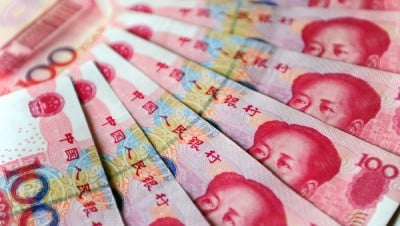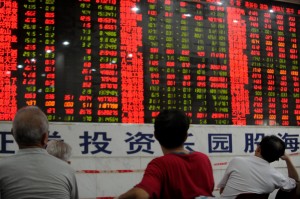Differing Views on China’s “Faltering Economy”, Growing Faster than “Stagnating Western Economies”

Ignore demagogues like Donald Trump claiming “China is taking our jobs…taking our money…They’ll take us down.”
Gerald Celente issued a “trend alert” headlined “Market Mayhem: Don’t blame China – It’s the (global) economy, stupid.”
China is far from blame-free. Celente calls its economy “the canary in the collapsing global-equity mine.” He forecasts markets plummeting by yearend. Chickens are coming home to roost.
Current market turbulence is “more than a…correction,” he stresses. “It’s a global recession” – how severe remains to be seen.
The influential right-wing Peterson Institute for International Economics (PIIE) supports anti-populist policies across-the-board – including deregulation, money printing madness, anti-consumer trade deals, near-zero interest rates, and gutting vital social justice programs.
Nicholas Lardy is a senior PIIE fellow. The New York Times featured his op-ed headlined “False Alarm on a Crisis in China,” saying:
There is little evidence that China’s economy is slowing significantly from the 7 percent pace reported by the government for the first part of the year.
Other market analysts estimate it at 4% or less. It’s reported economic numbers are inflated. Still, it’s growing much faster than stagnating US and EU economies.
Official July figures showed slowing industrial production and fixed asset investment, as well as sharply declining exports. Expect Shanghai Composite plummeting valuations to have a negative effect on consumer spending, weighing on private sector investment and economic growth.
Its equity market bubble may experience lots more deflating ahead – affecting other financial markets globally. Plummeting commodity prices reflect slowing growth.
China is the world’s second largest economy – the largest based on purchasing power parity. It’s an engine of global growth. Its economy and financial markets matter.
Whether they’ll experience crisis conditions remains to be seen. Given the fragility of global economies after years of excess, China may face economic and financial trouble for the first time in decades.
 The Shanghai Composite remains in bubble territory after around a 40% selloff – followed Thursday by what appears to be a dead-cat bounce. In the 12-month period ending June 2015, equity valuations soared over 150%. Retrenching so far may not be enough to reverse imbalances.
The Shanghai Composite remains in bubble territory after around a 40% selloff – followed Thursday by what appears to be a dead-cat bounce. In the 12-month period ending June 2015, equity valuations soared over 150%. Retrenching so far may not be enough to reverse imbalances.
Lardy claims market weakness doesn’t reflect “a sell-off in the fundamentals of the Chinese economy.” He believes it “may strengthen those fundamentals…”
Investor/author of “The Next Economic Disaster,” Richard Vague headlined a spring 2015 article “The Coming China Crisis,” calling “the great panic of China…in full swing.”
Its economy “fueled by runaway lending…produced far more housing, steel, iron, and a host of other goods than it knows what to do with, amassing unprecedented levels of overcapacity and, by my estimate, making a staggering $2-$3 trillion in problem loans in the process” Vague explained.
The main post-2008 crash engine of growth “is rapidly diminishing and will soon largely end. The only question is how.” Its bad debt problem is “unprecedented.”
America’s economy was hammered by a similar problem from fall 2007 to March 2009. Forecasts didn’t predict what lay ahead – or maybe a worse storm brewing now.
Vague says China’s current problem bears eerie resemblance to America’s 2008 private debt crisis and Japan’s in 1991 – after the Nikkei stock market index peaked on 1989’s last trading day.
China’s ratio of private debt to GDP exceeds 200%. It’s total debt ratio tops 280%. It “amassed the largest buildup of bad debt (and overcapacity) in history,” said Vague.
“Overcapacity is so significant in many sectors that it will take years for it to be absorbed by organic demand.” Millions of homes remain vacant. Housing represents about 20% of China’s economy. Its private sector is “massively over-leveraged.”
Its growth has been declining for years – “perhaps to a level approaching zero – and China will be left facing a ‘lost’ generation of very low growth similar to the last 20 years in Japan.”
Whether financial and economic contagion follows (and how severe) remains to be seen. Current global conditions may signal a major inflection point indicating significant trouble yet to unfold.
Stephen Lendman lives in Chicago. He can be reached at [email protected].
His new book as editor and contributor is titled “Flashpoint in Ukraine: US Drive for Hegemony Risks WW III.”
http://www.claritypress.com/LendmanIII.html
Visit his blog site at sjlendman.blogspot.com.
Listen to cutting-edge discussions with distinguished guests on the Progressive Radio News Hour on the Progressive Radio Network.
It airs three times weekly: live on Sundays at 1PM Central time plus two prerecorded archived programs.

